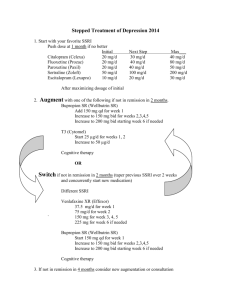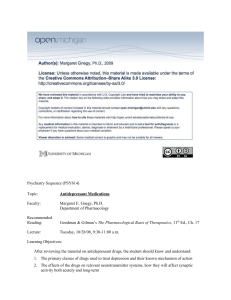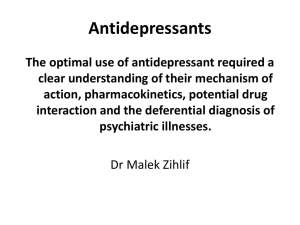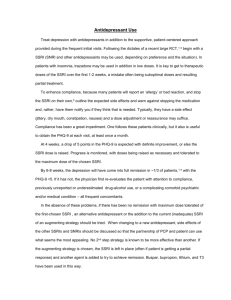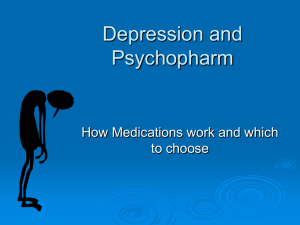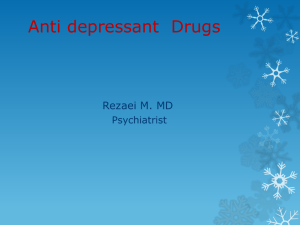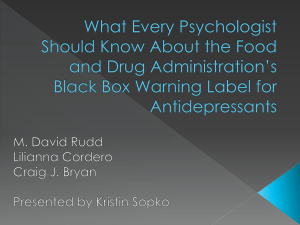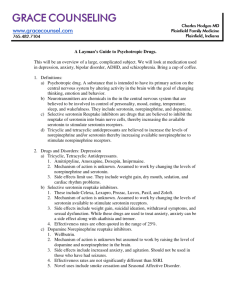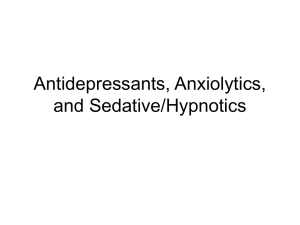SHERI SPIRT, M.D. PSYCHIATRY 142 WEST END AVE., SUITE 1R
advertisement
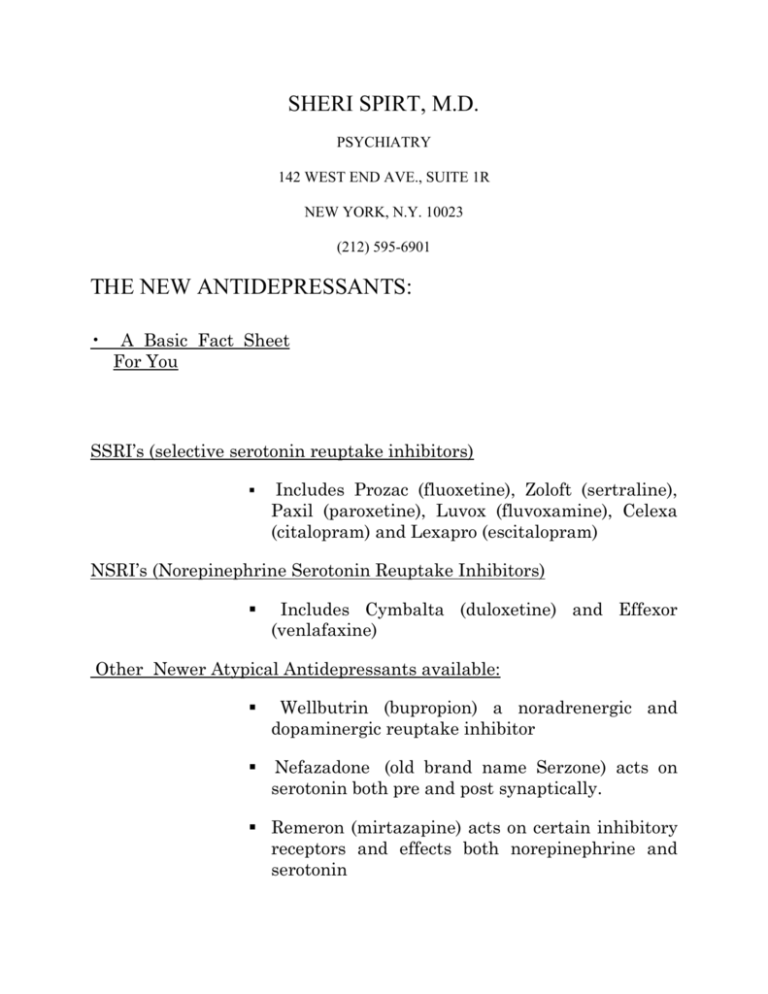
SHERI SPIRT, M.D. PSYCHIATRY 142 WEST END AVE., SUITE 1R NEW YORK, N.Y. 10023 (212) 595-6901 THE NEW ANTIDEPRESSANTS: • A Basic Fact Sheet For You SSRI’s (selective serotonin reuptake inhibitors) Includes Prozac (fluoxetine), Zoloft (sertraline), Paxil (paroxetine), Luvox (fluvoxamine), Celexa (citalopram) and Lexapro (escitalopram) NSRI’s (Norepinephrine Serotonin Reuptake Inhibitors) Includes Cymbalta (duloxetine) and Effexor (venlafaxine) Other Newer Atypical Antidepressants available: Wellbutrin (bupropion) a noradrenergic and dopaminergic reuptake inhibitor Nefazadone (old brand name Serzone) acts on serotonin both pre and post synaptically. Remeron (mirtazapine) acts on certain inhibitory receptors and effects both norepinephrine and serotonin Other medications often used additionally to treat depression: Lamictal (lamotrigine) - an anticonvulsant approved in the treatment of bipolar depression. Helps additionally to stabilize mood Zyprexa (olanzapine)- an antipsychotic with some antidepressant and anxiolytic properties Seroquel (quetiapine) similar to Zyprexa in efficacy. Abilify (aripiprazole) - another antipsychotic with antidepressant type features. Toprimax (topiramate) another anticonvulsant found to be effective in treating headaches, controlling appetite, and with some mood stabilizing properties. Another medication Zonegran has similar effects. Both are carbonic anhydrase inhibitors. Lithium- which has long been used first line to treat bipolar Disorder ahs been found to have some antidepressant characteristics, especially when added to another agent. The newer medications have become popular mostly due to their ease of use, their relative safety in overdose, and their being well tolerated by most patients. Common Side Effects • Nausea, Anxiety, Agitation, Sedation, Insomnia, Appetite Disturbance, Tremor, Headache, and Sexual Dysfunction. There is no way to predict who will experience certain side effects before starting medication. It is a trial and error process. • Nausea-25%, usually only in the beginning of treatment, gets better with time. Helpful then to take medication with meals. • Agitation-20%, also tends to go away with time, some other treatments if symptoms persist, are available. • Insomnia-20% reported. Changes in sleep architecture include decreases in REM and total sleep time, as well as increased wakefulness. Again, if this is problematic there are other treatment options to combat the problem. • Headache-best treated with any over the counter analgesics, i.e. ibuprofen. • Sexual dysfunction-decreased libido, anorgasmia, difficulty maintaining erection, -usually improves with time, or with a decrease in dose. On occasion certain other medications have also been found to be helpful in counteracting this side effect. Some examples include adding Wellbutrin, Gingo Biloba, Viagra or a similar drug if the problem is erectile difficulties, and others. In addition, depending on the medication drug holidays can be of help. • Dizziness-Don't stand up quickly, keep self well hydrated. • Other side effects-increased sweating (particularly at night), dry mouth, change in appetite-either increased or decreased, frequent urination, change in menses. IT IS VERY IMPORTANT TO REPORT ALL SIDE EFFECTS OR POTENTIAL SIDE EFFECT TO YOUR DOCTOR. Special Considerations: 1. Antidepressant response usually is delayed by a minimum of 2 weeks , often up to 8 weeks. Be patient, and don’t stop medication without consulting doctor. 2. Treatment of acute depression usually requires at least several months of continuous drug therapy; length of time recommended for optimum treatment is an individual decision and depends on factors like a prior history of symptoms, a family history of symptoms, and personal factors i.e. a female wishing to become pregnant. My usual protocol is to treat 9 months to a year after a first episode of depression before attempting to taper. If a relapse occurs I would recommend another 2 years of treatment. For 3 or more episodes I would recommend patient stay on medication indefinitely, pending other life circumstances, i.e. illness, pregnancy. 3. Most over the counter medications are safe in conjunction with the SSRI's, although because the SSRI's inhibit certain liver enzymes, medications that are broken down by these enzymes may stay around longer. For example, SSRI's actually can potentiate the side effects of oral contraceptive pills as OCP’s are metabolized by these enzymes and certain SSRI’s can inhibit the enzymes. It is always best to check with your doctor before taking another medication. 4. Do not drink, for the same reasons as outlined in three above, the effects of alcohol are potentiated. 5. No conclusive studies have demonstrated that SSRi’s are associated with an increase risk of suicide. Depression alone is associated with a 15% mortality rate. There have been patients on SSRi’s that have attempted suicide, but this could be because of a poor response to the medication, with continued depressive symptoms. Overall, studies have shown that the incidence of suicide in patients on an antidepressant is less than in untreated depressed patients. There have been other misrepresented concerns in the media regarding Prozac and other antidepressant medications; read with caution and discuss concerns with your doctor. How They Work: Research into the biological causes of depression revealed that low levels of a brain chemical called serotonin can result in depression. Serotonin is one of the neurotransmitters that carry messages in the brain and throughout the nervous system. Specifically, neurotransmitters are the chemicals that jump from one nerve cell to another over a gap called synapse. They bind to areas on the next nerve cell called a receptor to then continue the impulse or message to be transmitted. There are two types of receptors; a presynaptic receptor and the receiving or postsynaptic receptor. SSRI agents bind to the presynaptic receptors to block the reuptake of serotonin, thereby preventing the chemical from being metabolized and keeping it around longer. SSRI agents are fairly specific for the neurotransmitter serotonin, and thus are associated with fewer side effects than older antidepressant agents which may effect other neurotransmitters. One further point is that there is another neurotransmitter called norepinephrine which also seems to be associated with depression. Serotonin and norepinephrine have effects on each other through fancy neural circuitry. We are not clear to date as to the actual cause or change in body chemistry in depression but do know that these chemicals are involved, antidepressants act to change concentrations of these chemicals, over time antidepressants change the receptor sensitivity for the neurotransmitter, and antidepressants work.
